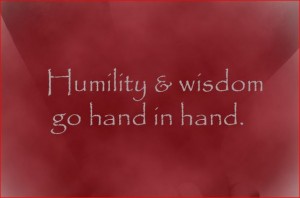Wisdom is the “motor oil” of every family dynamic. Without it, your family will freeze up, lock up, or blow up. When we think of “wisdom” we often think of knowledge. Einstein was a very “wise” man. We think of experience. The  one who has been around a long time and has been through it all has become wise. Time in and of itself, however, does not bring wisdom. There is a vast difference between age and wisdom. The late Howard Hendricks told his class about an acquaintance that had one year of experience 25 times. He said, “There’s a difference between having 25 years of experience and having one year of experience 25 times.” It’s not doing the same things over again that produces wisdom. Also, knowledge is not wisdom. You can learn billions of facts and figures and even understand advanced mathematical formulas, but that does not constitute wisdom. Wisdom is more than experience and it’s more than knowledge. In fact “knowledge” can be totally contradictory to God’s description of wisdom. It simply makes us proud and arrogant (See 1 Corinthians 8:1).
one who has been around a long time and has been through it all has become wise. Time in and of itself, however, does not bring wisdom. There is a vast difference between age and wisdom. The late Howard Hendricks told his class about an acquaintance that had one year of experience 25 times. He said, “There’s a difference between having 25 years of experience and having one year of experience 25 times.” It’s not doing the same things over again that produces wisdom. Also, knowledge is not wisdom. You can learn billions of facts and figures and even understand advanced mathematical formulas, but that does not constitute wisdom. Wisdom is more than experience and it’s more than knowledge. In fact “knowledge” can be totally contradictory to God’s description of wisdom. It simply makes us proud and arrogant (See 1 Corinthians 8:1).
The first chapter of Proverbs teaches us that “The fear of the Lord is the beginning of wisdom” (Proverbs 1:7). It’s mostly concerned with our relationship to God and to others that is the central focus of Biblical Wisdom. It’s not until we recognize our place in the master scheme of things and surrender ourselves to God’s will that we begin to grow wise. The wise person is praised in the Bible, especially in the book of Proverbs. He or she is honored by God. It’s not the arrogant winner, the self-sufficient millionaire, or the prideful successful celebrity that receives the title of “wise.” No it’s those who surrender to the greatness of God and worship Him. Wisdom and Humility go hand in hand. The wisest man ever to live, Solomon, connects the two in Proverbs 15:33. He writes, “The reverent and worshipful fear of the Lord brings instruction in Wisdom, and humility comes before honor.”
Unlike the secular system we live in, to God one cannot grow wise until he or she grows humble. James, the author of the Epistle, writes (James 3:13) “If you are wise and understand God’s ways, prove it by living an honorable life, doing good works with the humility that comes from wisdom.” Wisdom begins with the fear of the Lord. It then proceeds to produce humility, and finally results in thoughts and actions in our relationships with those around us. When James defines wisdom in some following verses (James 3:17-18), we see that wisdom finds its description in a person’s relationship with God and with others. He says, “But the wisdom from above is first pure, then peaceable, gentle, open to reason, full of mercy and good fruits, impartial and sincere.”